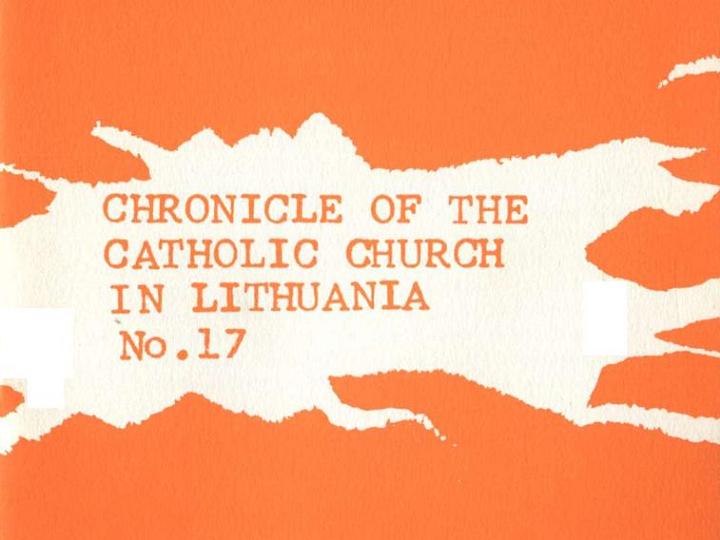The Statement of Rev. (Balys) Babrauskas
Some Thoughts on the Occasion of Victory Day
Lithuania July 4, 1975

CHRONICLE OF THE CATHOLIC CHURCH IN LITHUANIA
No. 17 
A Translation of Authentic Reports from Soviet-Occupied Lithuania
Published by the Lithuanian Roman Catholic Priests' League of America 351 Highland Boulevard Brooklyn, NY 11207
© Copyright 1978 by the Lithuanian Roman Catholic Priests'Leag of America
Printed by
Franciscan Fathers Press 341 Highland Blvd. Brooklyn, NY 11207
CHRONICLE OF THE CATHOLIC CHURCH IN LITHUANIA No. 17
Introduction
Although bearing no date as such, the seventeenth issue of the Chronicle of the Catholic Church in Lithuaniareports events as late as June, 1975. This issue of the underground publication reporting since 1972 details of the denial of human rights, particularly in matters of conscience and religion, in Soviet-occupied Lithuania devotes the first several pages to a detailed report of the trial of Nijolė Sadūnaitė.
Miss Sadūnaitė has been arrested on August 27, 1974. In her typewriter was found a page of the eleventhChronicle, in the process of being copied. After almost a year of interrogation, possibly in an effort to root out once and for all the elusive underground group responsible for the dissemination of the Chronicle, the thirty-seven year old woman was tried and sentenced to three years of labor camp and three years of banishment.
Her defense statement, quoted in this issue of the Chronicle, has evoked the sympathies of people world-wide for the plight,of predominantly Roman Catholic Lithuania, tenaciously clinging to the traditional faith in spite of thirty-four years of Communist persecution, varied only by a few years of Nazi occupation.
After a report of several other raids, arrests and interrogations in connection with possession of religious and other "anti-Soviet literature", this issue of the Chronicle reproduces a lengthy complaint addressed to Secretary General Brezhnev and other high Soviet and Church authorities by a group of Lithuanian priests, headed by Karolis Garuckas.
This is a carefully argued defense of those responsible for the Chronicle and other underground publishing activities. The writers argue that the Catholics of Lithuania have been denied for too long the religious literature and other rights guaranteed them by the Soviet Constitution, and by international agreements to which the USSR is signatory.
From the Diocese of Panevėžys comes a second petition to Brezhnev, signed by Father Balys Babrauskas, in which the thirty-nine year old pastor cites his own case and the cases of others, to show that, contrary to the Soviet Constitution, the atheists are given full rein to terrorize religious believers, while all appeals to law enforcement agencies on the part of the faithful go unheeded.
The Chronicle marks the thirtieth anniversary of Communism in Lithuania by complaining of the genocide which the victory of Communism brought to the tiny Baltic nation, the wide-spread drunkenness, and other evils attendant upon the Soviet occupation of the country, including the discrimination against religious believers.
The letter of an experienced teacher and an excerpt from the official publication for teachers in Soviet Lithuania give some insight into the systematic efforts to make atheists of the pupils in the Soviet school system.
The Chronicle of the Catholic Church in Lithuania thus continues to appeal to the conscience of the free world not to stand by idly while the moral holocaust continues.
Rev. Casimir Pugevičius Translation Editor






